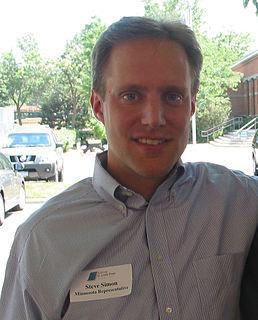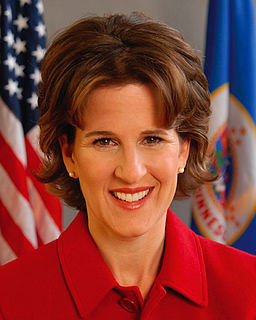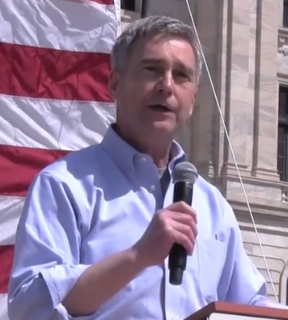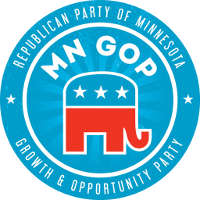
The 2008 United States Senate election in Minnesota took place on November 4, 2008. After a legal battle lasting over eight months, the Democratic–Farmer–Labor Party (DFL) candidate, Al Franken, defeated Republican incumbent Norm Coleman in one of the closest elections in the history of the Senate. Franken took his oath of office on July 7, 2009, more than half a year after the end of Coleman's term on January 3, 2009.

The 2010 Minnesota gubernatorial election was held on Tuesday, November 2, 2010 to elect the 40th Governor of the U.S. state of Minnesota for a four-year term to begin in January 2011. The general election was contested by the major party candidates State Representative Tom Emmer (R–Delano), former U.S. Senator Mark Dayton (DFL), and Independence Party candidate Tom Horner. After a very close race, Dayton was elected governor. Emmer would be elected to the United States House of Representatives four years later.
Tom Horner is a Minnesota politician and a member of the Independence Party of Minnesota. He was a candidate in the 2010 election for Governor of Minnesota.

Elections were held in Minnesota on Tuesday, November 2, 2010. Primary elections took place on August 10, 2010.

Elections were held in Minnesota on November 4, 2008. Primary elections took place on September 9, 2008.

The 2012 United States Senate election in Minnesota took place on November 6, 2012, concurrently with the U.S. presidential election as well as other elections to the United States Senate and House of Representatives as well as various state and local elections. Incumbent Democratic–Farmer–Labor U.S. Senator Amy Klobuchar was re-elected to a second term in a landslide, defeating the Republican nominee, State Representative Kurt Bills by almost one million votes, and carrying all but two of the state's counties.

The 2012 United States House of Representatives elections in Minnesota were held on Tuesday, November 6, 2012 to elect the eight U.S. Representatives from the state of Minnesota. The elections coincided with the elections of other federal and state offices, including a quadrennial presidential election and an election to the U.S. Senate. Primary elections were held on August 14, 2012.

The 2014 Minnesota gubernatorial election took place on November 4, 2014, to elect the governor of Minnesota concurrently with the election to Minnesota's Class II U.S. Senate seat, as well as other elections to the United States Senate in other states and elections to the United States House of Representatives and various state and local elections.

The 2014 United States Senate election in Minnesota was held on November 4, 2014, to elect a member of the United States Senate to represent the State of Minnesota, concurrently with the election of the Governor of Minnesota, as well as other elections to the United States Senate in other states and elections to the United States House of Representatives and various state and local elections.

A special election was held in the U.S. state of Minnesota on February 12, 2013 to elect a new representative for District 14A in the Minnesota House of Representatives, caused by the resignation of Representative Steve Gottwalt on January 7, 2013. A primary election was not held. The election coincided with the District 19A special election. Tama Theis, the Republican Party of Minnesota nominee, won the special election.

The 2014 United States House of Representatives elections in Minnesota took place in the U.S. state of Minnesota on November 4, 2014, to elect Minnesota's eight representatives in the United States House of Representatives for two-year terms, one from each of Minnesota's eight congressional districts. Primary elections were held on August 12, 2014.

The 2014 Minnesota Secretary of State election was held on November 4, 2014, to elect the Minnesota Secretary of State.

The 2014 Minnesota House of Representatives election was held in the U.S. state of Minnesota on November 4, 2014, to elect members to the House of Representatives of the 89th Minnesota Legislature. A primary election was held in several districts on August 12, 2014.

The 2014 Minnesota Attorney General election was held on November 4, 2014, to elect the Minnesota Attorney General.

The 2014 Minnesota State Auditor election was held on November 4, 2014, to elect the Minnesota State Auditor.

The 2016 Minnesota House of Representatives election was held in the U.S. state of Minnesota on November 8, 2016, to elect members to the House of Representatives of the 90th Minnesota Legislature. A primary election was held in several districts on August 9, 2016. The election coincided with the election of the other house of the Legislature, the Senate.

The 2016 Minnesota Senate election was held in the U.S. state of Minnesota on November 8, 2016, to elect members to the Senate of the 90th and 91st Minnesota Legislatures. A primary election was held in several districts on August 9, 2016. The election coincided with the election of the other house of the Legislature, the House of Representatives.

A special election was held in the U.S. state of Minnesota on February 9, 2016, to elect a new senator for District 35 in the Minnesota Senate, caused by the resignation of Senator Branden Petersen, effective on October 31, 2015. A primary election was held on January 12, 2016, to nominate a Republican Party of Minnesota candidate. Former state representative Jim Abeler, the Republican nominee, won the special election.

A general election was held in the U.S. state of Minnesota on November 6, 2018. All of Minnesota's executive officers were up for election as well as all the seats in the Minnesota House of Representatives, several judicial seats, a United States Senate seat, Minnesota's eight seats in the United States House of Representatives, and several seats for local offices. Special elections were also be held for a Minnesota Senate seat and Minnesota's Class 2 U.S. Senate seat. A primary election to nominate Republican and Democratic–Farmer–Labor (DFL) candidates and several judicial and local primary elections were held on August 14, 2018.























